Community and university partners host first film screening at the Pascua Yaqui Tribal Annex

Bringing a global concern close to home, Pascua Yaqui and Tucson community members gathered at the Pascua Yaqui Tribal Annex on May 9 for an evening exploring how water issues manifest for Tribes across the western U.S.
More than 80 attendees joined the Native Voices in Film and Sustainability Film Series event last month, gathering for a panel discussion featuring Tribal leaders, youth perspectives and university experts, along with a screening of the film “A Reflection of Life.”
“It's important for us to talk about water with the tribe because water is life,” Herminia Frias, Pascua Yaqui Tribe councilmember, said. “It's essential to us. It's essential to our being, and we see what's happening in our lives and the lives of our brothers and sisters every single day and the impact that it has when your water is contaminated and when you don't have access to it.”
The event, co-hosted by the Indigenous Resilience Center, the Pascua Yaqui Tribe, Arizona Environment, and The Loft Cinema, began with a blessing before the evening commenced.
“A Reflection of Life” is a feature documentary exploring environmental and water issues in the Pacific Northwest, while noting broader challenges facing the entire Western U.S. and amplifying Indigenous voices.
The filmmaker, Jesse Locke, interviewed members of The Confederated Tribes of Warm Springs, The Confederated Tribes of the Umatilla Indian Reservation, The Confederated Tribes and Bands of the Yakama Nation, Chugach Alaska Native Corporation and Valdez Native Tribes, The Klamath Tribes, The Nez Perce Tribe, The Hopi Tribe, and Standing Rock Tribe to gather the Indigenous stories and wisdom featured in the film.
Ahead of the screening, Councilmember Frias moderated the panel, which featured Dr. Karletta Chief, director of the Indigenous Resilience Center; Dr. Michael Johnson, Indigenous Resilience Center faculty member; Selso Villegas, Director, Water Resources, Tohono O'odham Nation; and Ruben Aguirre, Pascua Yaqui Youth Council member.
“Youth voices should be a part of environmental decisions because the youth are who it’ll affect,” Aguirre, who will be attending the University of Arizona starting in the fall, said. “We need to have a voice in our future so we, as a community, stay afloat.”
With backgrounds spanning dryland farming, natural resources management, water contamination and more, the panelists discussed the essential significance of water, the importance of connecting Tribes with resources to tackle climate change and environmental challenges, and the value of traditional knowledge and practices such as Indigenous agriculture.
Additionally, panelists emphasized how important youth voices are in inspiring change, as both sources of new ideas, as well as a reminder of the imperative communities have to preserve and improve the opportunities available for future generations.
“For me, it’s about creating opportunities for the children. The young people are the future,” said Michael Johnson, a UArizona faculty member featured in the film. “Those kids are so precious to us, they are like our seeds, they need to be taken care of, nurtured and loved.”
